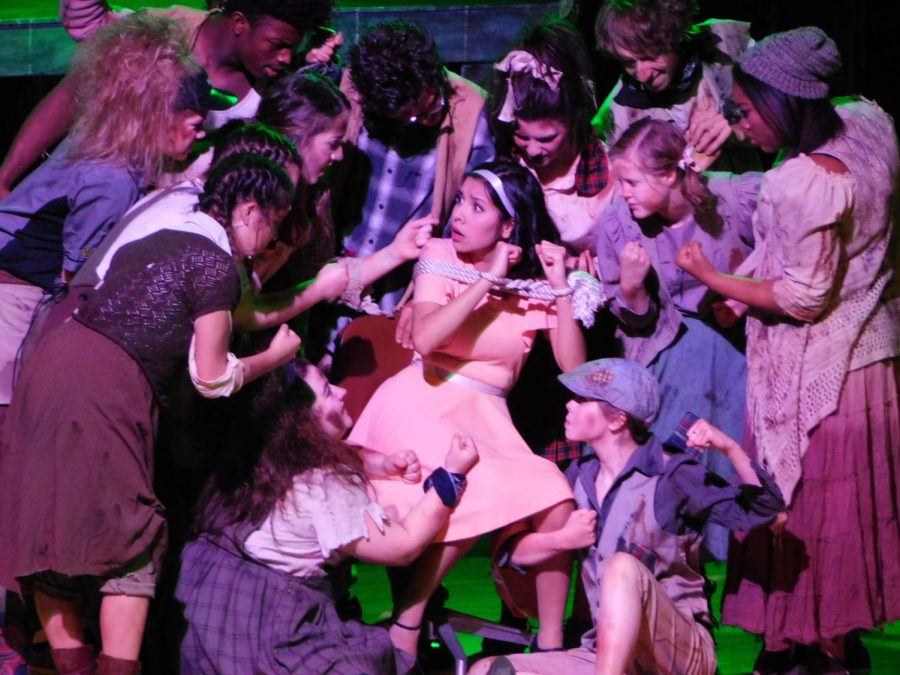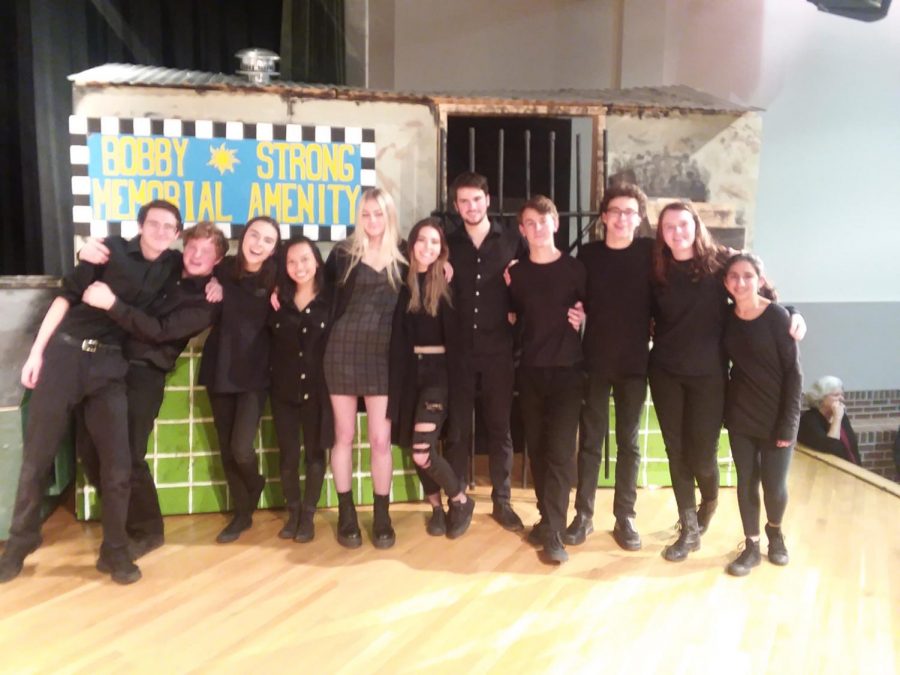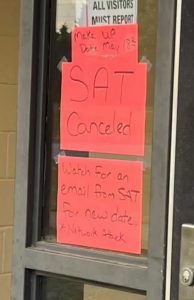MHS Goes to “Urinetown”
Feb 27, 2018
On February 1-3, the McIntosh theater department delivered one of the “best school plays I’ve ever seen,” according to audience member, Booth Middle School student Soryn Call. Despite “Urinetown”’s odd and doubt-causing title, the play was filled with an engaging story told by incredible acting, singing, dancing, and special effects. The show had many comedic moments, but also a compelling depth in others.
The plot of the play centers around two main characters, Bobby Strong, played by junior Iain Hemenway, and Hope Cladwell, played by junior Diana Avina. In a Romeo and Juliet-esque style, the poor boy with a revolutionary heart and the naive daughter of the tyrannical dictator fall in love despite all odds.
Her evil dictator father, Mr. Cladwell, was played by Ryan Robertson on Thursday and Friday and Colton Hayes on Saturday. As the exposition reveals, Cladwell stepped up to his throne years ago when the drought hit. He made the decision that toilet water is a waste of water and must be reduced to a minimum; the result is that people in the town have to pay a fee to use the public toilets and it is illegal to go anywhere else. Since he owns all public amenities, he and the workers of Urine Good Company (UGC) stay rich and everyone else is poor and living in miserable conditions. Cops make sure that anyone who bypasses the fees gets sent to Urinetown, which we later find out is not a real place — the cops simply kill the criminals.
The play satirizes the wealthy, with a greedy dictator who lets himself believe that he is doing the people a service, and poor people who have to face the consequences. Hope is sucked into this lie as well, and for the first half of the play she believes that her father is doing what is best for the entire town. On meeting Bobby and seeing how bad conditions really are, Hope is able to change her mind and go against her father. The play displays this decision as a loss of innocence for young Hope, adding depth to the show amidst the comedy. Another factor that added to the serious side of the play was Bobby’s father. Early on in the play, Bobby’s father was one of the so-called criminals that could not afford to pay the fee. Bobby is tormented by what he feels was a betrayal to his father, which adds to his internal struggle once he finds out Hope’s parentage.
The story follows Bobby’s struggle to lead the revolt against the tyranny of the UGC while still loving Hope. Bobby leads a revolution, and eventually is sent off the edge of a building to “Urinetown.” His death created a more thoughtful and sobering atmosphere to the entire play. Despite the death of the revolution’s leader, the revolution is not halted and Hope then finds a way to lead the revolution herself, eventually overthrowing her father with the help of the townspeople. From there, the cop/narrator, played by senior Perry Cox, tells the audience that while the revolution was successful, they could not find a way to survive the drought and everything ended horribly. Twist ending, am I right? The plot was compelling and beautifully acted, surprising the audience at every turn.
Officer Lockstock, played by Cox, served as the comedic narrator as well as one of the cops. His character often interacted with Little Sally, played by senior Morgan Weise, and together they often revealed exposition in a comedic format. He said that his favorite scenes to act were the ones between him and Weise, and that he “couldn’t ask for a better last role than Officer Lockstock.”
Junior Clay Lawhead played Hot Blades Harry, one of the more violent revolutionaries in the play. Lydia Campbell played Little Becky Two-Shoes, his partner in crime, if you will. Campbell said, “Becky Two-Shoes is this poor, schizophrenic, crazy character in the show. She was really fun to play.”
An especially impressive feature of this production was that all the choreography was done by a student. Senior Wylie Watlington spent at least an hour planning for each song.Watlington said, “I wanted to choreograph the show because I’ve enjoyed learning student choreography in the past, and I thought it would be really cool to continue the legacy of sorts and to get experience with choreographing.”
Though each song took about an hour, putting everything together took her months. She said that it was hard to juggle choreographing while still being in the play, but that having an ensemble role allowed her to catch up quickly.
She said, “My favorite memory from this show was watching the ensemble perform the “Snuff That Girl” choreography for the first time after I finished teaching. I had no idea how cool it would look on stage, but every single person looked amazing and they executed the choreography with such clean movement that they took my breath away.”
All in all, “Urinetown” was performed beautifully, complemented by the dancing, lighting and sound effects, and singing. Drama teacher Mr. Buswell has been working on this production for an incredibly long time, and his work definitely paid off.












